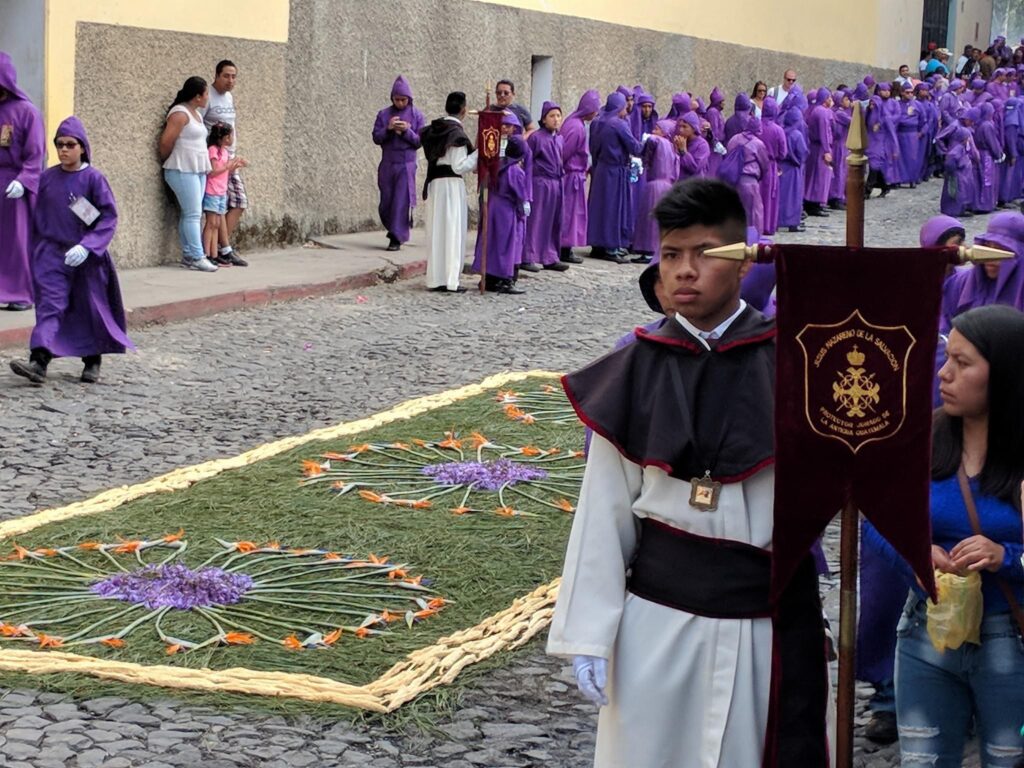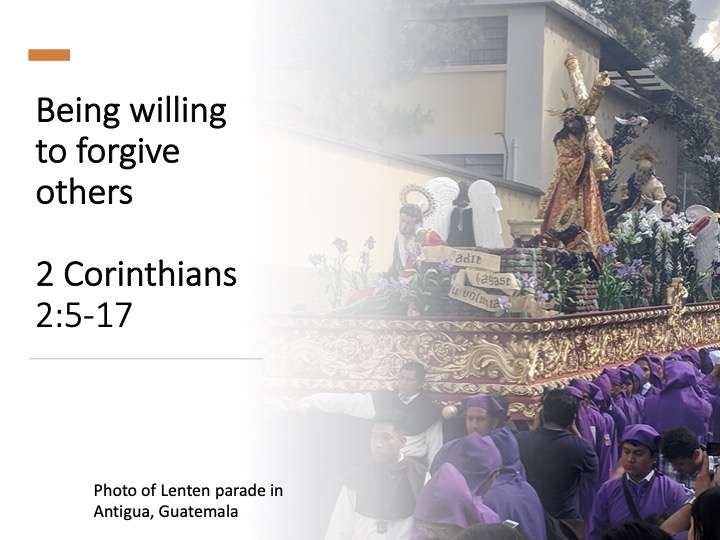Jeff Garrison
Bluemont and Mayberry Churches
July 2, 2023
2 Corinthians 2:5-17
In his book, What’s So Amazing about Grace, Philip Yancey makes a bold accusation about the church. [Jesus] “gained the reputation as a lover of sinners, a reputation that his followers are in danger of losing.” He then quotes Dorothy Day, the Catholic worker among the poor in the early 20th Century, who said, “I really only love God as much as I love the person I love the least.”[1]
Who do you love the least? What sins really turn your stomach? Why? How can we, as followers of Jesus, regain a reputation for being a lover of sinners. As I have noted in the first two sermons from Second Corinthians, we need grace and not just from God but from one another.
Would we want to live in a world without grace?
Yancey, in that same book, makes another bold statement, “the strongest argument in favor of grace is the alternative, a world of ungrace. The strongest argument for forgiveness is the alternative, a permanent state of unforgiveness… Where unforgiveness reigns… a Newtonian law comes into play: For every atrocity there must be an equal and opposite atrocity.”[2] Not the kind of place I’d want to live. Would you?
If the church wants to be serious about changing the world for the better, we must learn to forgive and to show grace even to those from whom we despise. It doesn’t me we downplay sin. But it does mean that we value all people as having been created in God’s image and worthy of our love.
Before reading the Scripture
So far, in our look at Second Corinthians, we’ve seen the trouble Paul faced in Asia[3] and Corinth.[4] We don’t know all the issues or reasons behind the trouble. We’re only hearing one side of the conversation. We also know that Paul sent other letters to Corinth in addition to First Corinthians.[5] These missing letters could help explain what is going on, but sadly they’ve been lost to history. We must make our best effort with what we know and depend on God’s Spirit to help us interpret the opening chapters of this letter.
In today’s reading, we’ll see that there was one person in Corinth who Paul may have called to be punished. Some assumed this was the man in an incestuous relationship with his stepmom, mentioned in Paul’s first letter.[6] For that, Paul chastised the Corinthians, telling them that even the pagan Romans didn’t allow such behavior. However, most scholars now question such a linkage. It sounds like the person Paul has in mind had had an encounter or at least his actions impacted Paul. Interestingly, Paul is now ready to forgive and move on and that’s part of the message here.
Read 2 Corinthians 2:5-17
Our text last week ended with a beautiful statement of the love Paul has for the Corinthian followers of Jesus.[7] Now Paul wants them to demonstrate their love as they forgive someone whom Paul has already forgiven. Love is perhaps best demonstrated in our willingness to forgive, just as God’s love for us in shown in God’s forgiveness in Jesus Christ.
Forgiveness
The first part of our reading has to do with the forgiveness of this unknown individual whom the Corinthian Church had punished. We don’t know the crime or what this individual did. One of the early Church fathers pastorally suggests Paul doesn’t mention the deed because he’s ready to forgive.[8]
Here we get insight into Paul’s thinking. Punishment is not for vengeance. In writing to the Romans, Paul reminds them that vengeance belongs to God, not us.[9] Punishment is only to be used to encourage people to get their lives back on track.
When someone repents of a wrong, Christians are called forgive. Paul realizes that harsh punishments, those which go beyond correction and the protection of the community, will only overwhelm the sinner. In their grief, there will be an opening for Satan to enter and to cause even more destruction to the one being punished. So, when repentance occurs, the community should immediately welcome the individual back into the fold and let bygones be bygones.
Welfare of the individual and the community
While I think Paul is mostly concerned for the eternal welfare of the individual who committed the sin, his rational also applies to the community who punished the individual. It is easy in our self-righteousness, to hate evil more than we love good. If you’ve ever read C. S. Lewis’ The Screwtape Letters, you’ll see how the Devil can use such righteousness to his own benefit. When we hate more than love, Satan wins.
Love
Love must exist at the heart of all who follow Jesus. We want to draw in more people to love and follow Jesus. If we’re only good at hating things, even sinful things, it eradicates our love. So, for the good of the Corinthians as well as the individual, they should forgive. And so should we. Letting go of grudges and forgetting about retaliation are marks of a true believer and a follower of Jesus.
Paul’s pastoral concern
Paul’s concern is pastoral. John Chrysostom, writing in the 4thCentury, notes that Paul is no longer speaking as a teacher here but as an equal. He places the Corinthians on the judgment seat as he acts as the advocate for the convicted man.[10] In a similar manner, Jesus will be our advocate before the judgement throne.
Paul’s “harsh letter”
In the next section of our reading, we have another glimpse at the struggles Paul faced in his journeys. As I pointed out earlier, there were more than two letters from Paul to the Corinthians. It is thought that between First and Second Corinthians, there was a third “harsh letter.”[11]
This letter may have dealt with the problems of the individual mentioned above. Maybe the person in question was a threat to the safety of the church. Perhaps his teachings were divisive, which is another problem Paul addressed in his previous letter.[12] Maybe Paul came down hard on the need to punish the individual, as he did with the man involved in an incestuous affair in First Corinthians. Whatever the reason, Paul finds himself concerned over the welfare of the church in Corinth and anxious for news.
Paul’s second visit to Troas
I also find it interesting that Paul, in Troas once again, finds the door open to his preaching. If you remember, Paul earlier visited Troas and found all the doors closed. Then, in a dream, he was called across the sea from Troas to Macedonia and onto the European continent.[13] But now, as he finds doors open to preach, Paul’s anxiety keeps him from taking advantage of this opportunity.
Paul again heads to Macedonia in search of Titus and news of the Corinthians. Sadly, the citizens of Troas lose the opportunity to hear Paul, but we are reminded that the God has entrusted the good news to frail human beings like Paul and us. And yes, thanks to the work of the Holy Spirit, the good news spreads even despite us.
The victory parade of the gospel
We learn of this spread in the last section of today’s reading, beginning in Verse 14. Paul describes it as a victory parade, in which the victors are seen in glory, spreading fragrance. Of course, such parades in Paul’s day would have included the defeated, the captured enemies, seen in their humility also being paraded through the city.[14] Paul uses this metaphor to remind us that the victory of the gospel doesn’t belong to us, but to God.
Antigua, Guatemala
A few years ago, I was on a mission trip to Guatemala. After our stint was over, conducting medical surveys in rural villages, I stayed a few days in Antiqua, an ancient city on the flanks of a volcano. This was during Lent. On Sunday afternoon, many of the streets were cordoned off. Local artists using flower petals and colored caulk, created murals along the street.
Then came the procession, which occurred every Sunday during Lent. Floats with depictions of Mary, the mother of Jesus, the disciples, and finally a statue of Jesus himself made its way into the city toward the Cathedral. In the front of the floats were priests, swinging their censers of incense that spilled out among the crowds.
Reading about Christ’s triumphal procession reminds me of that experience, although I must admit the incense drove my sinuses crazy and I ended up with a terrible infection. But what’s important is that victory belongs to God, and we are those called by God to do our small part in telling Jesus’ story to the world. We help spread God’s love, which is a fragrance smell to those being saved.
Conclusion
You know, if it was not for Christ, we’d all be lost. We’re all sinful, and only in Jesus can we find forgiveness. Because of our past failures and God’s acceptance, we are called to build a community that welcomes others. And because we have been forgiven, we need to forgive others. Instead of dividing people into “Us” and “Them”, the church is called to show the world a better way of welcoming each and every person as a sinner in need of God’s grace. Are we up to the task? The health of our community and world depends on it. Amen.
[1] Philip Yancey, What’s So Amazing About Grace (Grand Rapids, MI: Zondervan, 1997), 158.
[2] Yancey, 114.
[3] https://fromarockyhillside.com/2023/06/18/were-saved-by-gods-grace-to-help-others/
[4] https://fromarockyhillside.com/2023/06/25/restoring-relationships/
[5] Paul Barnett, The Second Letter to the Corinthians (Grand Rapids: Eerdmans, 1997), 28-31.
[6] 1 Corinthians 5:1-8. See Barnett, 124-125.
[7] 2 Corinthians 2:4. See https://fromarockyhillside.com/2023/06/25/restoring-relationships/
[8] Chrysostom, Homilies of Paul to the Corinthians, inAncient Christian Commentary on Scripture, New Testament, Vol. VII (Dower’s Grove, IL: Intervarsity Press, 1999), 206.
[9] Romans 12:19.
[10] Chrysostom, 207.
[11] Barnett, 128-129.
[12] 1 Corinthians 3.
[13] Acts 16:8-10.
[14] Barnett, 146-150.

Photo of Lenten processional in Antigua


I think forgiveness is truly important. I have forgiven and I’ve been forgiven in my personal life. But when I think of someone like Putin or Prigozhin, that’s much harder. I can think of some examples closer to home, but I won’t go there. I really enjoyed your Antigua photos.
Depending upon how we define ‘forgive’, yes, I can do that. But, it isn’t without consequences.
Here, when Paul is speaking of forgiveness, he’s telling the church they have to be willing to forgive. I think that’s still the case, however, there are times when the church can forgive but still should protect itself by restricting the access of the guilty party (such as with child abuse).
I think it’s easier to forgive someone then to forget what they did.
Sometimes forgetting is dangerous and isn’t the same as forgiveness. BTW, Mary, for some reason I am unable to post on your site (or any of the blogger sites unless they allow anonymous postings).
A convicting message, Jeff. Yes, we’re all sinners and God loves each of us anyway. We are to do the same. More easily said than done!
I enjoyed the photos from Antigua. One of my daughters spent time there in a language immersion program.
It’s a beautiful city, but with a volcano that keeps puffing away enough to keep everyone humble!
Ahh yes, the willingness to forgive others, it is a major importance for all. Outstanding post, and amazing photos. Thanks for sharing videos as well. Take care and enjoy your 4th of July celebrations.
I hope you had a great fourth, Karen!